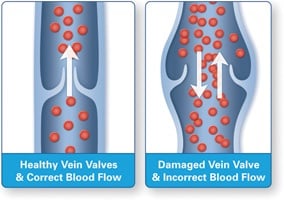Can Venous Insufficiency be Reversed?

Can Chronic Venous Insufficiency (CVI) be reversed?
Unfortunately the short answer to this question is no; but CVI can be treated with minimally invasive procedures which can reduce symptoms and improve quality of life tremendously!
Chronic Vein Insufficiency Causes
In order to understand why venous insufficiency or peripheral venous insufficiency cannot be reversed, we must look at what causes venous disease. The most prevalent cause of venous insufficiency is genetics. A family history of vein disease is the biggest predictor of whether or not most people will develop vein problems. If a parent, grandparent, aunt, or uncle has or had problems with veins, it is likely that the reason you have developed them is purely genetic. Currently in medical research, there is no way to prevent this trait from being passed down the family tree.
Another venous insufficiency cause is hormones. Particularly in women, any shift in hormones; normal menstrual cycle, hormonal birth control, hormone replacement, menopause, and a combination of factors in pregnancy; cause the valves and walls of superficial veins to become weak. It is the weakness of these vein structures that cause the symptoms associated with venous insufficiency including: leg fatigue, leg heaviness, leg swelling, nighttime leg cramps, leg pain, restlessness of your legs, vein itching, itchy legs, prominent varicose veins, and spider veins.
Trauma is another cause of venous insufficiency. Although only a few cases of venous insufficiency can be linked to trauma alone, it is quite possible that a traumatic injury to the leg can cause enough damage that would affect the venous system.
Research has suggested that other health conditions may contribute to the weakening of the venous system including; lower extremity lymphedema, diabetes, obesity, smoking, hypertension, and arterial disease. However, direct correlations among these factors are still being researched, and current studies reveal conflicting results.
Regardless of which of the above venous insufficiency causes directly contribute to your specific venous condition, once the superficial veins are insufficient (weak); similar to a stretched out rubber band, there is not a way for these veins to regain their elasticity. It is the loss of elasticity or compliance that causes symptoms. These peripheral venous insufficiency symptoms become worse as time progresses and can be aggravated by things such as standing in one place (working as a hairstylist, teacher, cashier) and sitting for long periods of time (driving, desk jobs, flying in a plane). At night leg restlessness and leg cramping can wake people from sleep or make it difficult to fall asleep. Summertime heat can aggravate symptoms as it causes veins to become dilated and weaker.
Chronic Venous Insufficiency Treatment
Although there is no cure for venous insufficiency or venous disease, symptoms can be helped with compression stockings, exercise, cooler weather, leg elevation, and some homeopathic regimens. When these conservative methods no longer help, straight forward, minimally invasive procedures exist to alleviate the discomfort associated with venous insufficiency. These modern techniques cause little pain and fast recovery for the sufferer.
If you are experiencing leg fatigue, heaviness, swelling, night cramps, pain, restlessness, itching, prominent varicose or spider veins, have your legs evaluated by our qualified Vein Specialist to discuss appropriate treatment options for your specific case.
Question: What can a venous reflux exam tell me? How does this treatment measure my veins effectiveness?
Read MoreQuestion: How long does the actual varicose vein surgery itself take and how much time should I expect for the recovery?
Read MorePregunta: ¿Cuáles son las mejores maneras de juzgar las calificaciones de un médico para el tratamiento de las venas? Mis venas están en forma horrible, y me dijeron recientemente que necesitaría 5 procedimientos diferentes de ablación y 6 citas de escleroterapia después. Tuve mi primer procedimiento VNUS por un médico de la vena en Gilbert…
Read MorePregunta: tuve mis inyecciones (escleroterapia) hace 3 semanas (no en el Instituto de vena avanzada de Arizona). Mi tobillo todavía está terriblemente hinchado. He vuelto dos veces para una ecografía y ningún coágulo. ¿Cuánto dura la hinchazón normalmente? Yo camino y no usar mis medias como se indica. Me está disuadiendo de continuar el tratamiento,…
Read MoreQuestion: What are the best ways to judge a doctor’s qualifications for vein treatment? My veins are in horrible shape, and I was recently told that I would need 5 different ablation procedures and 6 Sclerotherapy appointments afterwards. I had my first VNUS procedure by a vein doctor in Gilbert on the greater saphenous vein, and…
Read MoreQuestion: I had my injections (Sclerotherapy) done 3 weeks ago (not at Advanced Vein Institute of Arizona). My ankle is still terribly swollen. I’ve been back twice for an ultrasound and no clot. How long does the swelling normally last? I walk and did wear my stockings as directed. It is deterring me from continuing treatment…
Read MorePregunta: ¿se pueden tratar las venas normales? Así que tengo venas de color verde azulado muy largas en mi muñeca. Sé que hay normalidad pero odio cómo se ven. ¿Puedo tratarlo con escleroterapia? También tengo 2 largas venas verdes en mi pecho. ¡Ayuda! También tengo 15 años, ¿puedo pasar por la escleroterapia?
Read MoreQuestion: Can normal veins be treated? So I have normal very long green bluish color veins in my wrist. I know there normal but I hate how they look. Can I treat it with sclerotherapy? I also have 2 long green veins in my chest. Help! Also I’m 15, can I go through sclerotherapy?
Read MorePregunta: Tengo 50 años de edad; un soltero, y un maestro. En este momento tengo varices (aunque no son dolorosas) en mi pierna derecha. No estoy feliz de verlos. ¿Qué puede sugerir para disminuir su visibilidad?
Read MoreQuestion: What is “extensive vascular calcium deposits” when shown on X-rays?
Read More